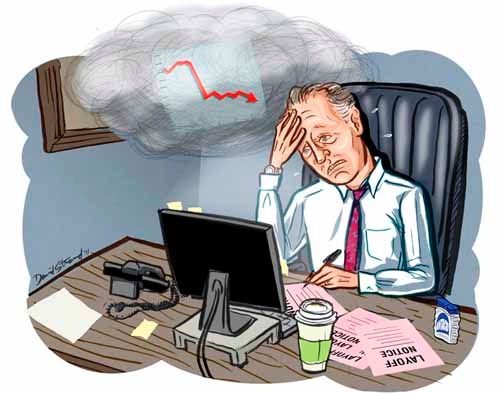Survey finds small-business owners more stressed

A new study says it’s pretty stressful out there for small-business owners.
We know what you’re thinking: This is one of those conclusions that just doesn’t need analyzing, kind of like those reports that determine smoking is bad for you or people who can’t afford cars are likelier to take the bus.
What’s unusual about this business survey, though, is that it shows persistently high levels of angst despite signs of an improving national economy. The Brother Small Business Survey found that 52 percent of small-business owners said their stress level is higher than normal, up from 51 percent a year ago.
Bruce Freeman, a spokesman for printer and fax-machine maker Brother International, said small-business owners can’t relax because they’re not sure the downturn has ended.
“The economic reports have varied, showing things are a little better on one day and a little worse on another. I think the issue is uncertainty,” Freeman said. “Small-business owners are not fully confident that we have a true recovery. They have a wait-and-see attitude.”
That’s the case for Mike Beardslee, president of information-technology consulting firm IT Strategies in Las Vegas.
Beardslee, whose company’s revenue dropped more than 70 percent in the recession, said he’s pretty much just as stressed out now as he was a year ago despite news reports of stabilized economic indicators. That’s because he has government contracts that he fears could disappear any day now.
“I wonder when the next shoe is going to drop,” Beardslee said. “I think, ‘Am I going to come in tomorrow and get an e-mail telling me I have to get rid of my consultants?’ ”
Uncertainty isn’t the only worry among local business owners.
Beardslee had to let go of most of his administrative staff, and take on their duties himself.
And at Gatski Commercial Real Estate Services in Las Vegas, owner Frank Gatski said he and his employees work three times harder now to earn a third of the revenue his company took in before the downturn. His staff count dropped from 85 to 70, as he pared workers to survive.
“But the service had to stay high. With a lot of properties, we have the same number of tenants, and even properties with fewer tenants still need to be managed,” Gatski said. “My biggest stressor is keeping my clients happy, because they are stressed as well, and they are the livelihood of my company.”
That task has become even tougher given the fluid nature of commercial property ownership in Southern Nevada. As struggling properties go from owner to receiver to bank to new owner, it’s tougher to develop long-term relationships. Some of Gatski’s managed properties have seen five different owners over a year — all of them with different service demands and standards.
And then there are the intangibles.
Beardslee said he still feels a lot of emotional turmoil over employees he had to let go.
“A couple of them are still unemployed. I don’t feel good about that,” he said. “I wish I could hire them back, but I can’t. The revenue is still not there.”
One of Gatski’s lowest points came when he had to cut employees’ pay by 10 percent.
“For my personality and who I am, it was horrible. I’ve been in a growth mode since I’ve owned my company. It was the first time I’ve ever had to go backward,” said Gatski, who said he’s since restored his employees’ lost pay.
At least one Las Vegan has seen better business in the recession.
Nathan Smith, a business coach with ActionCOACH, said his client base has grown about 10 percent in the recession, as business owners flock to him for advice on grappling with job stress.
“They’ve had to survive by cutting back on staff, technology and a range of other things,” Smith said. “The reason they still feel stressed is they’re doing everything themselves. The main thing is they just don’t have enough time. Working longer hours creates family challenges. They’re not able to do the things they used to do.”
Both Beardslee and Gatski said their stress levels could dip with a few months’ worth of steady revenue growth.
Until that happens, though, it’s important to curb stress both in and out of the office, Smith said. He recommended boosting time-management efforts, starting with setting specific goals and breaking business operations down into more manageable parts.
That’s an approach Gatski took, breaking his 7.2 million-square-foot portfolio into smaller chunks and assigning each piece to a unified “pod” including a senior property manager, an assistant manager, an accountant and a maintenance technician.
It’s just as important to set aside time for personal pursuits, Smith said.
“Find something you used to enjoy and make sure you’re doing it on a regular basis,” he said.
Beardslee said he’s taken to leaving his laptop off from Friday night through Monday morning and indulging in the occasional round of golf on weekends.
Gatski has started running Summerlin’s trails with his pug-Shih Tzu mix, Peggy. In January, he bought a sailboat that he keeps in Newport Beach, Calif., for the occasional getaway.
“You’re sitting there thinking, ‘I have all this liability, and all this stress. What am I doing it for?’ You have to reward yourself in some way,” he said.
Contact reporter Jennifer Robison at jrobison
@reviewjournal.com or 702-380-4512.